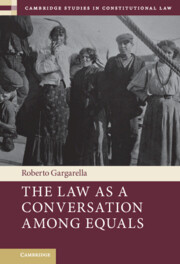Book contents
- The Law As a Conversation among Equals
- Cambridge Studies in Constitutional Law
- The Law As a Conversation among Equals
- Copyright page
- Contents
- Preface
- Acknowledgments
- 1 Constitutionalism and Democracy
- 2 The Law As Conversation among Equals
- 3 “Democratic Dissonance”
- 4 A Constitution Marked by a “Discomfort with Democracy”
- 5 Motivations and Institutions: “If Men Were Angels”
- 6 The Structural Difficulties of Representation
- 7 The Rise and Fall of Popular Control
- 8 The Periodic Vote, or “Electoral Extortion”
- 9 Checks and Balances
- 10 Presidentialism
- 11 Rights
- 12 Social Rights and the “Engine Room”
- 13 Judicial Review
- 14 Constitutional Interpretation
- 15 Constitution Making
- 16 The Birth of Dialogical Constitutionalism
- 17 Why We Care About Dialogue
- 18 “Democratic Erosion”
- 19 The New Deliberative Assemblies
- 20 Conclusion
- Bibliography
- Index
20 - Conclusion
For a Conversation among Equals
Published online by Cambridge University Press: 25 April 2022
- The Law As a Conversation among Equals
- Cambridge Studies in Constitutional Law
- The Law As a Conversation among Equals
- Copyright page
- Contents
- Preface
- Acknowledgments
- 1 Constitutionalism and Democracy
- 2 The Law As Conversation among Equals
- 3 “Democratic Dissonance”
- 4 A Constitution Marked by a “Discomfort with Democracy”
- 5 Motivations and Institutions: “If Men Were Angels”
- 6 The Structural Difficulties of Representation
- 7 The Rise and Fall of Popular Control
- 8 The Periodic Vote, or “Electoral Extortion”
- 9 Checks and Balances
- 10 Presidentialism
- 11 Rights
- 12 Social Rights and the “Engine Room”
- 13 Judicial Review
- 14 Constitutional Interpretation
- 15 Constitution Making
- 16 The Birth of Dialogical Constitutionalism
- 17 Why We Care About Dialogue
- 18 “Democratic Erosion”
- 19 The New Deliberative Assemblies
- 20 Conclusion
- Bibliography
- Index
Summary
In the penultimate chapter of the book, I explore the recent and attractive practice of “deliberative assemblies”. I maintain that the political crisis unleashed by “democratic erosion” (a crisis that was examined in the previous chapter) led to the creation of problem-solving alternatives that involve much more inclusive public discussion in places like Australia, Canada, Iceland, and Ireland, among several others. Through this chapter, I analyze these experiences and demonstrate that if the collective procedure is organized properly -even in the context of extremely numerous, plural, complex, multicultural, diverse, and conflictive societies- inclusive debate is possible and, above all, worthwhile.
Keywords
- Type
- Chapter
- Information
- The Law As a Conversation among Equals , pp. 308 - 326Publisher: Cambridge University PressPrint publication year: 2022

